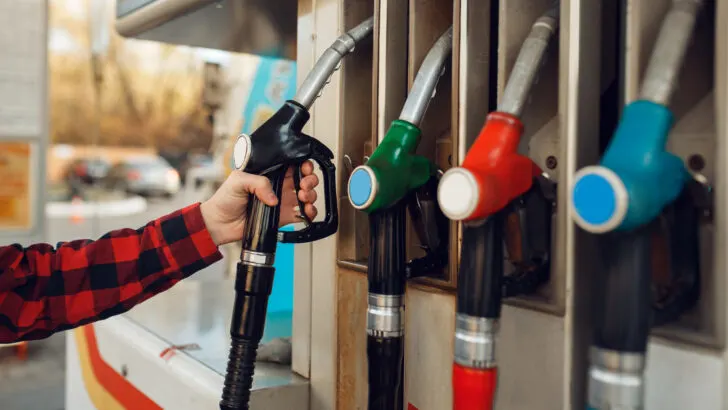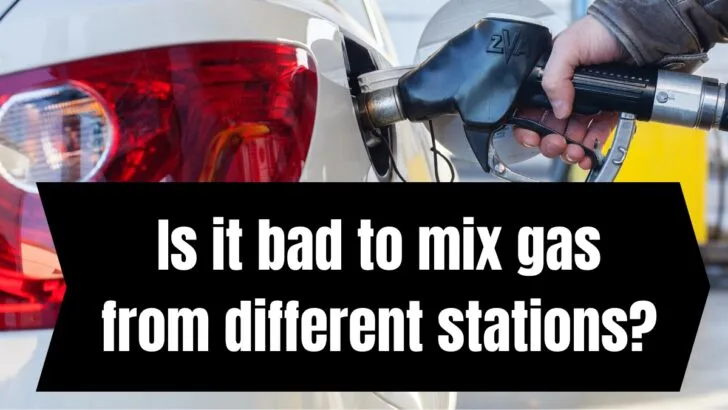While you may have occasionally heard that mixing gas from different stations is bad, is it actually going to harm your car?
You can easily and safely mix gas from different stations without suffering any engine problems with your car.
In fact, if you had to empty your vehicle’s gas tank between refueling, it would make traveling to different states or cities much more difficult. Luckily, while the prices may be slightly different between different stations in different locations, a large number of gas stations get the same gas from the same major suppliers.
Avoiding Additive Build-Ups
There is actually a benefit when it comes to getting gas from different stations and locations. If you always buy the same gas type from the same station, your vehicle is most likely getting an abundance of the same additives.
All gasoline has a certain mix of combustion chemicals and additives that help prevent freezing, clogging, and ensure it can be moved through your engine without trouble.
By switching up the location and quality of gas, you are getting a different mixture of additives.
The benefit here is that you won’t be adding the same additives to your gas tank each time, giving them a chance to wear down and pass through the system.
While these changes in additives are mostly seen between regular and premium gasoline, you can also find different additive mixtures in regular fuel from different sources.
Mixing Regular and Premium Gasoline
When purchasing gas for a new vehicle, it’s important that you know whether the vehicle was made for regular fuel or premium. Some vehicles require premium, while others can switch between them depending on your preferences, local availability, and budget.
Premium fuel will cost more per gallon in almost every situation, but it may not always be the best choice for your vehicle. Smaller family vehicles won’t always need premium gasoline and can work just fine on regular.

Contrary to general belief or expectations, premium gas does not increase your engine’s performance overall, and it won’t keep your valves and injection lines any cleaner than regular fuel will.
However, some vehicles specifically require premium gasoline. This will be noted in the vehicle’s manual or on the gas tank lid itself. In this case, you should never use regular gasoline for this vehicle and always invest slightly more per gallon for premium fuel.
If you want to learn more about mixing premium gas and regular gas, be sure to visit this link for a more detailed explanation and considerations.
Understanding Different Gas Volatility
When it comes to refueling in the hotter months of the summer or in tropical or desert locations, gas volatility can be another potential fuel consideration to keep in mind. This term refers to the rate at which gasoline will vaporize when passing through your vehicle’s fuel system.
During the colder winter months, or in cooler locations such as the mountains, volatility is of very little concern, and you won’t need to be worried about high or low vaporization amounts. However, when temperatures rise in the summer months, a low-volatility gasoline is required in almost every situation.
However, at almost every station in every US state, you won’t need to specifically ask about the volatility of the gasoline at the station where you are being refueled. The station itself will manage the volatility percentages to remain within legal levels.
For example, in most areas, it’s required by law for stations to sell gasoline with a volatility of less than 9 during the hottest months of the year. In other areas, 7 may be the max. This is done so consumers get what they pay for, and also to prevent damage to the vehicle the gas is being added to.
In both cases, the volatility will be low enough to prevent high amounts of vaporization. This also helps you save money since you won’t need to refuel as often in the summer.
Low volatility also prevents problems called vapor lock in your fuel pump which, over time, can damage your vehicle and cost quite a bit in maintenance and repairs.
If you happen to be confused about volatility in your fuel, you can always ask the station itself or the fuel pump attendants depending on the area.
You can also check the signage and text on the fuel pumps themselves. In many cases, you can find the volatility percentage of the fuel at that time and particular station directly on the pump.
Conclusion to Mixing Gas From Different Stations
It’s not bad to mix gas from different gas stations. In fact, it offers you benefits of different additives if you continue to go to different gas stations to pump gas.
It won’t harm your car to mix gas.
